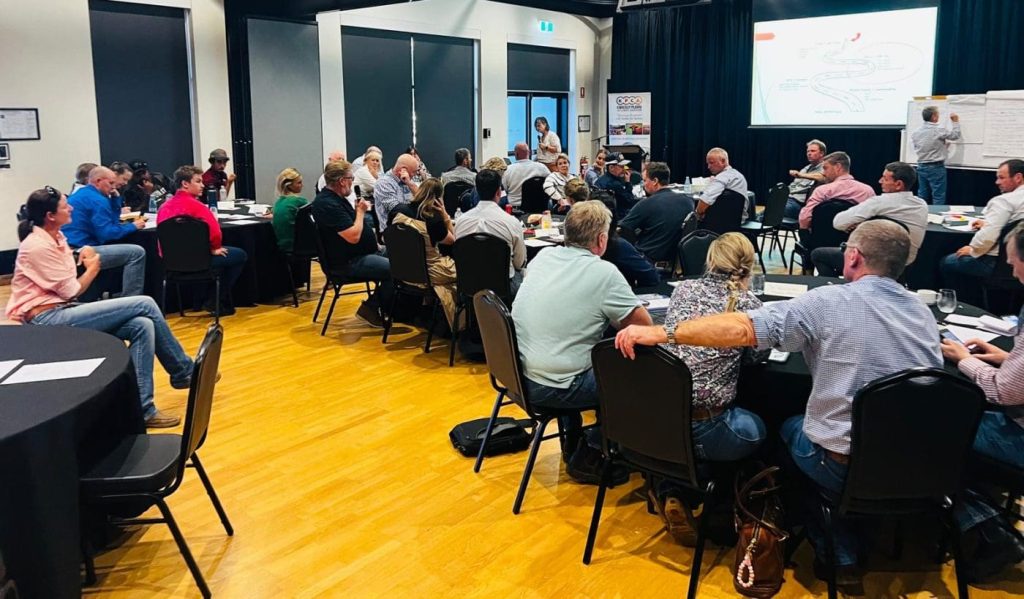
THE need for improved communication and understanding of government assessments and reporting methodologies were two of the key outcomes from a Pastoral Lease Forum hosted by the Kimberley Pilbara Cattlemen’s Association during its recent annual conference held in Karratha.
The forum was attended by more than 50 concerned pastoralists from the Kimberley, Pilbara and Gascoyne regions who appreciated the opportunity to raise their concerns with key members of the Departments that provide oversight of the state’s pastoral leases.
More than 200 pastoralists and industry representatives met for the three-day 2024 Kimberley Pilbara Cattlemen’s Association’s Conference, hosting more than 30 expert speakers from across Australia.
KPCA chief executive officer Bron Christensen said the association had decided to convene the Pastoral Lease Forum following an increasing number of concerns and angst by landholders across the region regarding the efficacy of pastoral lease assessments undertaken by the various Western Australian government departments which provide oversight of the pastoral leases.
“Similar issues were being reported by lease holders across all areas of the Kimberley and Pilbara,” she said.
“Rather than attempting to advocate for each individual pastoralist across a variety of Departments, the option of bringing the concerned pastoralists together with the decision makers of the Departments for an open, honest and frank discussion was a more productive one.”
The state Departments of Planning, Lands and Heritage (DPLH), Primary Industries and Regional Development (DPIRD), Water and Environmental Regulation (DWER), and Biodiversity, Conservation and Attractions (DBCA) were represented by their directors general, deputy directors generals or regional managers, with the chair of the Pastoral Lands Board and the Western Australian Soil and Lands Commissioner also attending.
“The KCPA is thankful that Department leaders appreciated the depth of the concerns being raised by the pastoralists and recognised the need to attend in person or nominate a representative at a senior level who had the capacity to influence change if required,” Ms Christensen said.
The forum provided a structured discussion focusing on the methodology of pastoral land condition assessments and conflicting inter-departmental legislation regarding fodder production on grazing land.
Forum facilitator Gaye Mackenzie led the attendees through a process of education on the methodology of pastoral lease oversight and identification of inconsistencies or lack of process adoption as experienced by pastoralists.
These discussions included the reasonings behind Departmental processes as well as the productivity and emotional effect on beef producers.
Key outcomes from the forum included:
- A commitment from several Departmental representatives to ensure due process in assessments is adhered to
- Opportunities for improved communication between Departmental representatives and pastoralists including the provision of general strategic advice to meet compliance requirements; and
- The development of an inter-departmental and pastoralist consultative committee for ongoing refinement of the assessment methodology and procedures for improved oversight and adoption.
Ms Christensen noted that while not all issues were able to be addressed at forum, the event provided the opportunity for improved relationships between the pastoral lease governing bodies and Kimberley and Pilbara beef producers.
“The KPCA intends to build on the outcomes from the Forum to continue the seek solution focused outcomes for issues of concern for our members and local landholders,” she said.
Record 200 attendance
This year’s KPCA conference, the largest to date for the organisation established nine years ago, attracted more than 200 producers and industry representatives converged on the Red Earth Arts Precinct in Karratha over three days.
This year’s conference theme was ‘Better Beef Business.’
“Consequently, our conference was a mix of grass-roots information on issues of concern for our members and Kimberley and Pilbara pastoralists coupled with more strategic presentations on industry direction,” KPCA chair Jak Andrews said.
However, every topic came back to all of us doing our beef businesses, whether as a pastoralist or in industry, better.”
Topics presented at the Conference ranged from carbon, biosecurity, animal welfare, markets and live export and included a thought-provoking session on men’s health.
“Our ‘Blokes Talking to Blokes’ session was very well received,” Jak said.
“It was simply six blokes, sitting on couches on the stage, talking about two of the most pressing issues affecting rural men at the moment – mental health and prostate heath. Being well in both body and mind is a necessity for doing our beef businesses well and the mix of information and the raw honesty that came out of this session was powerful.
“We sincerely thank all participants for being involved and it was especially pleasing to note that following this session, quite a number of men indicated they had or would be organising a check up in the near future.”
The Conference day program culminated in an irreverent presentation by keynote speaker David Williams from investment advisors Kidder Williams, which set the mood for the Gala Dinner that brought the Conference to a close.
The 200 guests at the Gala Dinner were encouraged by emcee and auctioneer Tiny Holly to dig deep to support the KPCA charity auction which raised more than $24,000 for the Royal Flying Doctor Service, the Pancare Foundation, and the KPCA Future Leaders Industry Initiative, supporting critical services, cancer research, and emerging leaders.
